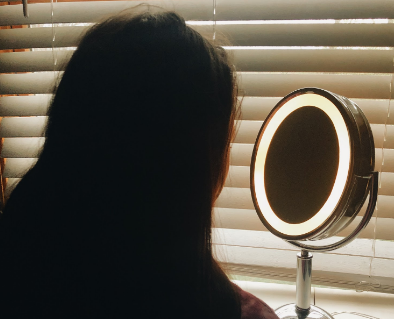The Power of an Imperfection

A student looking in the mirror checking her makeup for imperfections
A diastema. A gap. An imperfection in need of correction by braces. My reflection in the mirror seems to be swallowed by a small slit between my two front teeth. It is natural to have critiques over your own appearance, but the struggle to learn to love your own differences may be the most difficult task of them all.
At some point along the way of trying to figure out the secret behind being a human, the possibility of getting stuck on one small thing– whether it be acne, height, or a gap between one’s teeth– can occur.
According to the New York Post, a study conducted by OnePoll stated, “. . . 57 percent of Americans cover their mouths when they laugh due to insecurity over their teeth . . .”
The study continued by saying, “Young adults are even more uneasy when they laugh seeing as 62 percent of people ages 25-44 cover their mouths whereas only 20 percent of people 45 and up do the same.”
Though, insecurities can range from more than one’s smile. An anonymous RHS student stated, “I’m insecure about my acne. I cover it up with makeup to hide it because I don’t like the way I look . . .”
So, how does one accept the flaw that consumes our existence? The answer lies in beginning with the acceptance that a flaw of any form isn’t actually a bad thing; rather it is something that makes us human.
“Error and errancy are not tragedies. They are ingredients of and directions to discovery. They show us paths that humble us, startle us, and point us to new horizons. They do not have to lead to regret or shame. We say yes to our imperfection and accept our mistakes,” said psychotherapist and author David Richo on Mission.Org.
To begin the journey of self-acceptance over one’s appearance, start with ignoring the negative thoughts that demand fixation. TinyBuddha.com explains the best way to practice this is to ask oneself, “Does this thought serve me and my purpose? Does this thought actually help me?”
Another way to accept your differences is to talk to others. Despite 7 billion people, feeling alone about struggles of any kind affects everyone. To avoid solitude mindfulness, talk with a friend, parent, doctor, or other trusted individual about the things that daunt you in the mirror.
Lastly, practice gratitude in everyday life. To accept the thing that scares you most in the mirror, compliment others to train yourself about the positive association involved with compliments. After a while, your gratitude to others will begin to show itself in your own reflection.
Though focusing on something in your mirror like a gap between your teeth may seem to consume your own being, Mission.Org states, “What you regard as limitations is good fortune clothed as adversity, yet when applied correctly can transform your life.”
To begin to love the person full of differences that stares back at you in the mirror, start with acceptance of your own physical appearance. Eventually, everything else will follow.

Lainy is a senior and this is her second year in journalism. As a Staff Writer and Editor, Lainy is beginning to experiment with her future of a major in journalism. She spends most of her time being a barista outside of school while still juggling being a member of NHS, the Cappies, VAB, Student Body, Mock Trial and SNHS. She looks forward to pursuing her passion and furthering her education in journalism.





